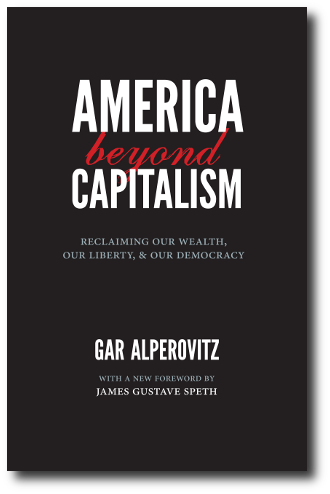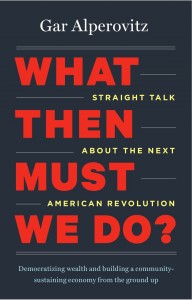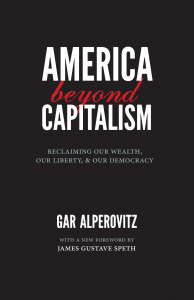 I’m delighted to report that the thesis of America Beyond Capitalism has been the subject of thought-provoking commentary from across the political spectrum.
I’m delighted to report that the thesis of America Beyond Capitalism has been the subject of thought-provoking commentary from across the political spectrum.
In the New York Times blog “Economix,” Professor Nancy Folbre of the University of Massachusetts, Amherst wrote a piece last month entitled “Utopian Capitalism.” She discusses the admission among capitalists like Richard Branson of the Virgin Group that the “short-term focus on profit has driven most businesses to forget about the long-term role in taking care of people.” She continues:
If all owners, bankers and corporate executives were virtuous souls, capitalism might function flawlessly. Adam Smith outlined a similar argument in the mid-18th century, in “The Theory of Moral Sentiments.” The pursuit of economic self-interest, he explained, would generally be tempered by natural morality.
…
Most economists, whatever their political stripes, generally put more emphasis on incentives than on virtue. And most ordinary people understand that the incentives built into the global capitalist system tend to reward some very bad behaviors.
Large corporations can often squelch their competition. They can minimize their costs by dumping waste products into the environment, contributing to pollution and global warming. They can use their profits to buy political influence. If they don’t like the regulatory policies of one nation-state, they can simply shift their operations to another.
…
Can we do something to minimize the perverse incentives that our current form of capitalism creates and move closer to our free enterprise ideals?
In his new book, “America Beyond Capitalism,” and in a recent opinion article in The New York Times, Gar Alperovitz makes a strong case for promoting cooperatives and worker-owned businesses.
The idea of empowering workers and communities to be able to control the economic decisions that directly impact their lives has even been welcomed on the website of the business magazine, Forbes. In “Are We Wandering Toward Socialism?,” contributor Erika Andersen writes approvingly of a community-based conception of “socialism”:
[L]et’s step away from the fear-mongering for a moment and be clear – here’s the actual definition of socialism: “a theory of social organization that advocates the vesting of ownership and control of the means of production and distribution, of capital, land, etc., in the community as a whole.” In other words, a system of cooperative vs. individual decision-making and ownership.
…
there are already many, many examples (some of them very innovative) in the US of cooperative or community ownership that have nothing to do with Federal, or even state, government. For example, Gar Alperovitz, a professor of political economy at the University of Maryland, wrote a really excellent, thoughtful op-ed piece in the NYT last month about just this fact. He notes, for instances, that 130 million Americans participate in the ownership of co-op businesses and credit unions, and that more than 13 million Americans have become literal worker-owners of more than 11,000 employee-owned companies.
…
Alperovitz offers the example of an integrated group of worker-owned companies in Cleveland that, in collaboration with local hospitals and universities, “has taken the lead in local solar-panel installation, “green” institutional laundry services and a commercial hydroponic greenhouse capable of producing more than three million heads of lettuce a year.”
Brave new world, in a good way…
My New York Times Op-Ed also led to a thoughtful review in Spain’s largest-circulation newspaper, El País. In it, Gabriel Jackson discusses my prior work on atomic diplomacy, and writes of the appeal of a cooperative economy [English translation]:
Last Dec. 15, an article appeared in The New York Times that led me to contemplate the future of the human race with slight optimism…[it] evaluates the importance of various political trends of recent years that virtually nobody has mentioned…
He goes on to advocate for scaling up worker-empowering and environmentally sustaining projects to deal with global problems:
Today, and even more in the near future, the fact that the world population is rapidly growing makes it absolutely necessary to find some kind of global planning for the limited use of natural resources and some control of climate change. We also need to develop an international scale; a cooperative economy which Professor Alperovitz assures is increasing in the U.S. with the intention to overcome the economic disaster of 2008. A combination of elements is by no means easy, but necessary.
Finally, the new edition of America Beyond Capitalism has been able to provide some historical context for younger readers. I mention in my Times piece, which was reiterated by Folbre and Jackson, that public opinions on economic systems are shifting. Considering that a very recent Pew Research Center poll found more support for “Socialism” than “Capitalism” among those 18-29, one of my goals is to clarify those terms, and ask the question, “If you don’t like capitalism or state socialism, what do you want?” (My recent lecture exploring this question can be viewed, listened to, or read.)
Blogger Peter Beattie, who wrote a book review entitled “America towards cooperativism,” recently framed the issue of the prospects of systemic change as such:
If I were to propose a way to put the United States, and the rest of the world, on a path towards a sustainable economy and a liveable, humane, and vibrant society, I would begin like this: First, I would nationalize the media, revising the constitution to institute the media as a democratically-controlled, de jure fourth branch of government. I’d then turn to the nationalization of the banks, energy companies, and all other natural monopolies, creating a democratic governing structure for nationalized industries equally responsive to their workers and the public at large. Then I’d cut the military by 80% or so, re-purposing “defense” companies with government contracts to build a sustainable energy infrastructure, and a sustainable agriculture system. Maybe then I’d focus on democratizing university governing structures while increasing funding both to eliminate tuition fees and to equip them to produce far more graduates with advanced degrees to form the core of a massive increase in adult education nation- and worldwide. Oh, and then there’s the matter of instituting maximum work weeks and work-sharing requirements, to both increase free time and eliminate unemployment.
Unfortunately, taking a flight of fancy such as this soon puts one in the position of a Wiley E. Coyote, pausing and looking down to realize that he has left the ground beneath him a while ago, and is now hundreds of meters above the floor of a canyon. As one plummets down, reality becomes clear: the next presidential election will be between a Mormon private equity capitalist and a milquetoast reformer with the daring of an ostrich and a big crush on financiers. There. Is. No. Hope.
But then comes a book written by someone with over half a century’s worth of experience with social change, to say: “those who say that nothing can be done because reactionaries control everything simply do not recall or do not know how impossible the world felt before the ‘unexpected’ explosions of the 1960s.” Well – that is me. “Those who tell me the opposition to change, now, is so great that nothing can be done would do well to read just a bit about what it was like before the civil rights movement was a movement.” Touché! OK, old man – whaddya got?
…
The heart of the book is a revealing, surprising, and heartening description of how much progress has already been made, under the radar, in a staggering variety of cooperative, municipal and employee-owned enterprises.
…
As opposed to my flight of revolutionary fancy above, Alperovitz’s vision is a piecemeal, ground-up process of continual development and improvement. His idea, it seems, is that the cooperative sector can grow to such an extent that its existence, and viability, will become apparent on a national level. And, when the next economic crash comes (just give the financial sector a little more time), the idea of cooperativism will be prominent enough that it will form the paradigm the federal government will have to turn to in reforming and rebuilding the economy.
 AMERICA BEYOND CAPITALISM
AMERICA BEYOND CAPITALISM



 Agenda
Agenda  Posterboard
Posterboard 